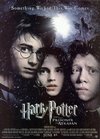Harry Potter and the Prisoner of Azkaban Review
By Joe Lozito
Welcome Back, Potter
From the opening moments of "Harry Potter and the Prisoner of Azkaban", during which the boy wizard (or can we call him a teen wizard now?) finally parts company with his increasingly annoying foster parents, it's clear that we're not watching a Chris Columbus movie. The camera is handheld, the colors are washed out, and even the music has a slight hint of dread to it. In short, Harry's growing up. For the phenomenally successful Potter franchise, this is a good thing. Harry's first two film outings were faithful to the books, but lacked any real visual flair, aside from the obvious special effect gimmickry. In the novels, J.K. Rowling's world has been described to such a degree as to create a following on par with that of "Star Trek" and "Lord of the Rings". In the films, however, Mr. Columbus' direction was more utilitarian, working off the faithful-to-a-fault adaptations of Steven Klowes; the previous two films have been too reverent to come into their own.
With "Prisoner", "Y tu Mamá También" director Alfonso Cuarón injects a much-needed element of artistry into the film's visuals. The camera bobs and sweeps, the cinematography is grittier and more real, and even Hogwarts itself takes on a real feeling of place (it actually seems like a school for once, rather than a big setpiece). The special effects are still there, of course, and they feel even more magical because they exist in a more real setting. Most impressive is the Hippogriff, a classic piece of Harryhausen nostalgia; it's a beast part bird and part horse and all attitude. The scene in which Harry wins the trust of the animal generates a real feeling of tension. Also of note are the Dementors, the Ghost-of-Christmas-Future-esque creatures with a nasty way of sucking out your soul.
When not dazzling the audience with his visual technique, however, Mr. Cuarón struggles with bringing some interest to Mr. Klowes script. Unlike the first films, very little is at stake here. The plot revolves around an escaped wizard (go-to villain Gary Oldman, on autopilot) stalking the halls of the school and Harry's continued investigation of the death of his parents. Of all the films so far, this one may benefit most from knowing the source material. Having not read the book, the film's plot felt disjointed and confused. There is a protracted twist, of course, and a scene involving time travel which harkens too closely to "Back to the Future II", not to mention several superior Sci-Fi stories, but I wanted to see more of the school and the magic.
The young cast members are clearly struggling to find their range. While Emma Watson and Rupert Grint are able to sustain their respective supporting roles of Hermione and Ron, the real work falls on the shoulders of Daniel Radcliffe, in the unenviable position of going through adolescence as the world's most-watched wizard. Mr. Radcliffe has some trouble conveying the deeper feelings of the character, but he is a charismatic young actor and, barring any sudden growth spurts, he may yet show some range in future films.
The rest of the who's-who-of-British-acting cast is all up to par, especially Emma Thompson as the flighty Prof. Trelawney and David Thewlis in a wonderful turn as the new Professor of the Dark Arts. Alan Rickman is back as the dangerously one-note Snape and Robbie Coltrane continues to be warm and fuzzy as Hagrid. Michael Gambon takes on the role of Dumbledore from the late Richard Harris, imbuing the role with a welcome sense of mischief; he's more father-figure than wizard, and it works.
Regardless of its cinematic shortcomings, the Harry Potter film series still has a ton of life in it. Like its cast, the franchise is still going through growing pains. I look forward to seeing Harry and the films continue to grow up, and that's more than I can say for most adolescents.
